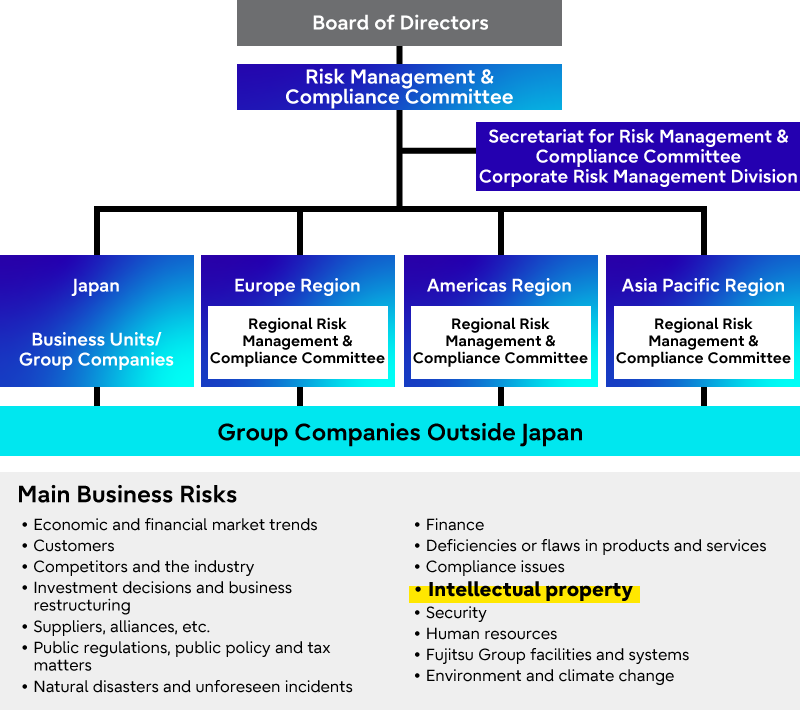- Intellectual
Property TOP - Intellectual Property
Strategy to Support Fujitsu's
Purpose - Intellectual
Property Portfolio - Brands &
Trademarks / Design
& Design Rights - Intellectual Property
Management and
Risk Compliance - International
Standardization
and Rulemaking - Efforts to Utilize
Intellectual Property
for Co-creation - Evaluations from
Third Parties
Intellectual Property Management and Risk Compliance
Intellectual Property Management and Reduction of Risks
One key mission of the Intellectual Property Division is identifying and reducing risks related to intellectual property that lead to damage to corporate value through intellectual property management, including appropriate management of intellectual property and compliance.
Risk Management Compliance Structure
The Fujitsu Group established the Risk Management & Compliance Committee under the Board of Directors with the purpose of understanding key risks associated with business activities, including risks related to intellectual property, and formulating countermeasures designed to avoid, mitigate, and transfer risks, while persistently reviewing these countermeasures. Additionally, the committee prepares response measures in the event of risks becoming realized, despite the implementation of various countermeasures.

OSS Compliance
At the same time as utilizing Open Source Software (OSS), which is essential for developing and improving the quality of digital technology and IT services, the Fujitsu Group also contributes to the development of OSS by participating in communities and actively engaging in the open-sourcing of our own technology. We practice OSS compliance and respect OSS developers and communities to enable our customers to safely use the software. Specifically, we have established internal regulations to ensure proper OSS use, and we manage how the software is used by our organization, with a focus on the Intellectual Property Division.
In recent years, a nested inventory system called the Software Bill of Materials (SBOM), which summarizes and manages software components, has been rapidly gaining acceptance and—especially for software delivered to the US government—OSS usage–reporting based on SBOM is becoming increasingly mandatory. Going forward, the importance of OSS management by the Intellectual Property Division will accelerate, while compliance with SBOM may become a necessary condition when conducting global business.
- Fujitsu's Intellectual Property
- Intellectual Property Strategy to Support Fujitsu's Purpose
- Intellectual Property Portfolio
- Brands & Trademarks / Design & Design Rights
- Intellectual Property Management and Risk Compliance
- International Standardization and Rulemaking
- Efforts to Utilize Intellectual Property for Co-creation
- Evaluations from Third Parties
